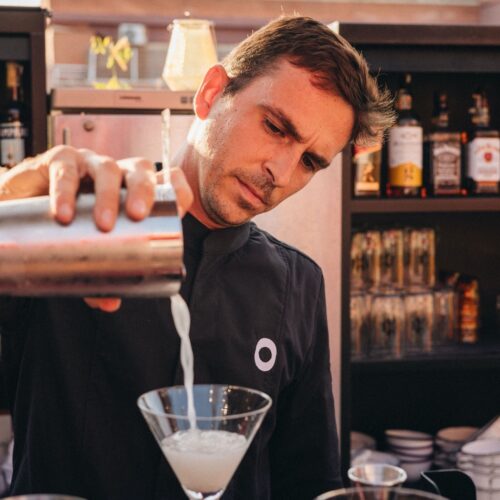By Vivek Subramanian, VP of Engineering and Product
I’ve been fortunate in my career to have worked at large companies like Siebel and Oracle, co-found a startup and take it through acquisition, and lead product/engineering at a high growth unicorn, Coupang, in Korea. I have been on the painful side of getting disrupted (Siebel by Salesforce) and on the exciting side of disrupting traditional retail (Coupang). A year in, I am even more encouraged by the signs I see that Sonder (here’s a brief intro to Sonder) is the latter — transforming an age-old industry and re-imagining the future of hospitality. Here are five reasons why:
1. This is classic disruptive innovation. Marketplaces pave the way for full-stack businesses
I spent the last 4+ years in e-commerce. When I joined Coupang, it had a few hundred million dollars in sales. When I left, it was north of $5Bn. The difference — we had transformed the company from an eBay-like marketplace to an Amazon-like company. We built massive warehouses and launched our own last mile delivery network. We created magical experiences that our customers loved. For example, our delivery men could ascertain that a customer was a mom with a small baby, and would knock on doors instead of ringing the bell. They presented customers with roses when they moved apartments. Our customers loved us. All of this was possible because we owned the end-to-end experience i.e. we were full-stack.

E-commerce was one of the early disruptive innovations and there is a lot to learn by studying its evolution. The first wave of disruption was the eBay-type marketplace model. This model is easy to set up and scale. Get a few software engineers to launch a platform that brings together buyers and sellers. Scale it rapidly by throwing a ton of marketing dollars and hope that scale keeps you in the game. The problem, however, is that marketplaces fundamentally lack consistency. Third-party sellers have different delivery speeds, different return processes, and even different product quality. Ultimately, a company like Amazon comes along and invests in building the operational backbone that provides consistent service to customers. It takes time to hit the tipping point, but once they do there is no stopping them.

Homeshare platforms have pioneered a marketplace for alternative accommodations to chain hotels, but there are no branded alternative equivalents with quality, standardization and style. And with travel, consistency is even more important. For most people, it is the single largest line item spend in their annual budget, especially if you include airfare and time off from work. A bad accommodation experience can destroy a vacation and has huge opportunity costs. I believe there is going to be an Amazon equivalent, a company that provides spaces that are beautifully designed, versatile, in diverse neighborhoods, at great prices, and with consistently top-notch service.
2. Huge first mover advantage in a supply constrained market
It took me a while to internalize how big of an advantage being first is. In e-commerce, supply is practically infinite. Sellers can list the same product on multiple platforms and manufacturers can increase supply by producing more in a matter of weeks. With real-estate, amazing locations with the proper construction, zoning and other standards are finite. Today, Sonder is one of the leaders in this space and the more we grow, the bigger the competitive moat becomes.
3. Reinventing a BIG industry creates many auxiliary opportunities
Reinventing the hotel model where units are distributed, uniquely designed and have no lobby is a huge task. We are rethinking age-old processes like housekeeping, room service, supply chain and interior design, from first principles. If done right, this could disrupt many other traditional industries in the process. For example, the in-house technology we’ve built to manage concierge and housekeeping services could be extended to residents in a building or city. And with instant-booking for long-term rentals we’re taking the first steps toward providing housing as a service — a world where renters do not have to sign long-term leases. Stay 6 months with us and at the end of it, go to our site find a new apartment you like in a new neighborhood, click a few buttons and done. You can imagine a day when your belongings would be packed and moved for you on the day your lease ended — just go to work and return to a new home that’s been set-up and furnished for you beautifully.

4. Balancing hyper-growth and fiscal responsibility
The last decade and a half saw a lot of purely digital businesses being built — Google, Facebook, LinkedIn etc. Those were the low hanging fruit of the post-internet era. We are now seeing full-stack businesses, i.e. businesses built at the intersection of domain expertise, operations, and technology — think Tesla (auto), Katerra (construction) etc. These are operations-heavy businesses and cannot function with a “grow at all costs” mindset. They require a high growth mindset balanced with ruthless fiscal discipline. At Sonder, I continue to be amazed at our focus on unit economics and strong business principles, all while growing very rapidly.
5. Building a culture, not just a company
A great part of Sonder’s amazing culture is its long-term thinking. Our goal is to be one of the best hospitality brands in the world. It requires building a great team and the willingness to make difficult tradeoffs for the long-term. Many companies underestimate the importance of developing leaders. At Sonder, we focus not only on keeping the hiring bar high but also on developing leaders internally. We have an amazing leadership coach on staff, Alita Watson. How many Series C companies that you know of have a full-time employee whose primary job is developing leaders?
Final thoughts
My teammate Khang Tran says he was looking for inspiration when he came to Sonder after 4 years spent at another company. Yes, we are a team inspired by what we do. I am inspired by our interior design team, our operations team and hospitality agents who open our doors, extend our care and never let anyone down. I am inspired by world-class teammates and I am inspired by our vision – to build the future of hospitality. It is time we reintroduce humanity in the accommodations industry and harness the power of technology to democratize travel and deliver jaw-dropping experiences with service, comfort, and style.
The global accommodations industry is getting close to a trillion dollars. This is a highly fragmented market with the largest hotel chain owning just 3.7% market share. So the opportunity is right in front of us. The path ahead is not easy by any stretch and we need amazing people to help us get there. Drop us a note if you’re interested in our journey.





